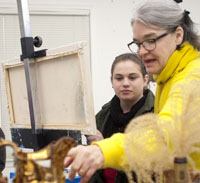Ensuring Equitable Access to Education

Judy McBroom ’64
The time Judy McBroom ’64 spent behind the Red Brick Wall was instrumental to the person she is today.
“It was the foundation for the rest of my life,” said Judy, who recently made a gift to the College to help create that same foundation for a new generation of students. “The emphasis on personal relationships between students and between students and faculty was so important. I felt really supported by the College.”
The Judith Hall McBroom ’64 Endowed Fund to Advance Racial Justice will support first-year bridge programs, including Summer Transition at Randolph (STAR), that are dedicated to helping high school graduates transition into college life. It will also be used to bring in speakers and sponsor events focusing on racial justice.
“Our country has not dealt with the issue of racial inequities, systemic inequities in our system,” Judy said. “We have a history we haven’t really struggled with, in terms of incorporating the true view of history into our national consciousness. More broadly, I want the fund to be used to create constructive dialogue, enrich civic engagement and educate the community on issues of racial justice and white privilege.”
Her interest in supporting STAR was inspired by a scholarship, named for Martin Luther King Jr., that is offered annually in her Seattle-area neighborhood. She was a founding member of the group that created it 40 years ago.
“I became aware of how often first-year students in college, particularly minority students and poor students, drop out,” said Judy, a former high school English teacher. “It’s just too big of a leap, and they need additional support.”
STAR, which was created in 2019, offers that support through a mix of academic and social activities—a concept Kim Sheldon, Randolph’s director of student success, often refers to as scaffolding.
“That word comes out of educational research, and it is a big part of what our students need right now, especially coming off of the COVID-19 pandemic,” Kim said. “Their experiences in high school may have been very chaotic. All of the support we have in place in the bridge from the summer to the first semester and beyond help to lift them up.”
STAR students arrive on campus early each fall and spend two weeks earning academic credits, familiarizing themselves with campus, meeting faculty and staff, and getting to know their classmates. They do coursework focused on building academic skills necessary for college-level work and participate in daily study halls and meetings with tutors.
“Having those two weeks to get accustomed to campus were invaluable,” said Patience Wallace ’25, who participated this fall. “I think I would’ve struggled to adjust to moving in, having orientation and then going straight into classes. I’d recommend it to all incoming freshmen, particularly ones that may have been homeschooled or deal with anxiety and adjusting to new situations.”
With the new funding, Kim wants to expand STAR beyond the first semester and focus more deeply on helping underserved populations.
“The STAR program is transformational,” Kim said. “Students who participate build confidence in themselves as students and Randolph community members. I wish every first-year student could have this opportunity.”
Judy’s gift will make a real difference to students, said Marianne Ramsey, director for principal and planned giving.
“Programs like STAR aim to improve student outcomes and ensure that factors like race, ethnicity and income do not determine who is successful at Randolph,” she added. “We are deeply grateful to Judy for her generous investment in STAR and her commitment to ensuring equitable access to education for our students.”
Make a Lasting Difference
Like Judy, you can plan a legacy that creates opportunities for future generations of students. To learn more about making a gift that supports your passion at the College, contact The Planned Giving Office at 434-485-8050 or plannedgiving@randolphcollege.edu.

